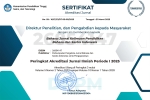Penggunaan Model Problem Based Learning dalam Pembelajaran Bahasa Indonesia Pada Era Vuca
Abstract
The purpose of this research is to describe the use of the Problem Based Learning model in Indonesian Language Learning in the Volatility, Uncertainty, Complexity, and Ambiguity (VUCA) era. VUCA is a condition that shows rapid, unpredictable, uncertain, complex, and unpredictable changes in various fields, especially education. In this study used the method of literature study. The data analysis techniques used were (1) Examining VUCA and its possible problems and solutions in learning Indonesian, (2) Examining various components in learning Indonesian that might be a solution to the problems encountered in learning Indonesian, (3) Determine components that have great opportunities as solutions to overcome problems in the VUCA era, namely learning models because in the use of learning models other learning components can be integrated. (4) Synchronization between the characteristics of the problems that might arise in the VUCA era, general learning principles (scientific approach), specific principles of Indonesian language learning (genre-based approaches, genre pedagogy, and Content Language Integrated Learning -CLIL), use of ICT, HR demands XXI century, character that must be built or internalized, and independent learning, and (5) Designing synchronization results in the form of material content and activities to be carried out in PBL steps. The results of the research are in the form of a PBL model design in Indonesian language learning in the VUCA era that collaborates and integrates general learning principles, Indonesian language learning principles, the demands of 21st century human resources, ICT, the character that students must have, independent learning in PBL steps to achieve learning objectives that have been set.
Keywords
Full Text:
PDFReferences
Ali, S. S. (2019). Problem Based Learning: A Student-Centered Approach. English Language Teaching, 12(5), 73. https://doi.org/10.5539/elt.v12n5p73
Alfita, L., Kadiyono, A. L., Nguyen, P. T., Firdaus, W., & Wekke, I. S. (2019). Educating the External Conditions in the Educational and Cultural Environment. International Journal of Higher Education, 8(8), 34-38.
BNSP. (2010). Paradigma pendidikan nasional abad xxi. Badan Standar Nasional Pendidikan.
Creswell, J. W. (2012). Educational research: planning, conducting, and evaluating quantitatice and qualitative research. Pearson Education.
Fahmi, R., Muslem, A., & Usman, B. (2021). The use of Problem Based Learning to improve students’ speaking ability. English Education Journal, 12(2), 260–281. https://doi.org/10.24815/eej.v12i2.17920
Gilakjani, A. P. (2012). The Significant Role of Multimedia in Motivating EFL Learners’ Interest in English Language Learning. International Journal of Modern Education and Computer Science, 4(4), 57–66. https://doi.org/10.5815/ijmecs.2012.04.08
Iskandarwassid, & Sunendar, D. (2008). Strategi pembelajaran bahasa. Bandung: Program Pascasarjana UPI dan PT Remaja Rosdakarya.
Kartiwa, I. (2022). Pendekatan VUCA dan Trasformasi Pendidikan. https:// www.indonesiana.id/read/155693/pendekatan-vuca-dan-transformasi-pendidikan indonesia
Kemdikbud. (2016). Silabus Mata Pelajaran Sekolah Menengah Pertama (SMP), Mata Pelajaran Bahasa Indonseia. Kemdikbud.
Kemdikbud. (2019). Kurikulum Merdeka. Kemdikbud P3GTK.
Keputusan Kepala Badan Standar, Kurikulum, dan Asesmen Pendidikan Kementerian Pendidikan dan Kebudayaan, Riset, dan Teknologi Nomor 009/H/KR/2022 tentang Dimensi, Elemen, dan Subelemen Profil Pelajar Pancasila Pada Kurikulum Merdeka. (2022).
Klímová, B. F. (2013). Multimedia in the Teaching of Foreign Languages. Journal of Language and Cultural Education, 1(1).
Konaspi. (2016). Arah Kebijakan Pendidikan Guru di Indonesia.
Kustandi, C., & Sutjipto, B. (2013). Media Pembelajaran. Galia Indah.
Latha, S., & Christopher, P. B. (2020). VUCA in engineering education: enhancement of faculty competency for capacity building. Procedia Computer Science, 172, 741–747. https://doi.org/10.1016/j.procs.2020.05.106
Lisnawati, I. (2021). Speaking learning based on multimedia. Journal of Language and Linguistic Studies, 17(4), 2046–2056. https://doi.org/10.52462/jlls.147
Muhtadi, A. (2019). Pembelajaran Inovatif. Kemendikbud, P3GTK.
Nababan, F. (2018). VUCA dalam Dunia Pendidikan. https://analisadaily.com/berita/arsip/2018/4/9/535362/vuca-dalam-dunia- pendidikan/
Pujiriyanto. (2019). Peran Guru Dalam Pembelajaran Abad 21. Kemendikbud P3GTK.
Pultoo, A., & Oojorah, A. (2020). Designing remote education in a VUCA world. International Journal of Computers & Technology, 20(May), 45–52. https://doi.org/10.24297/ijct.v20i.8713
Sagala, H. S. (2010). Supervisi Pembelajaran dalam Profesi Kependidikan. Alfabeta. Sanjaya, W. (2011). Strategi pembelajaran berorientasi standar proses. Kencana Prenada Media Group.
Sanjaya, W. (2013). Perencanaan desain dan sistem pembelajaran. Kencana Prenada Media Group.
Solihah, A., Rasyid, Y., Attas, S. G., & Firdaus, W. (2021). Vocabulary Knowledge Students of Indonesian Language Text Books. Ilkogretim Online, 20(1).
Soraya, N. A., Tias, S. A., & Ayu, K. (2022). Nasionalisme Bangsa Di Era Vuca (Volatility, Uncertainty, Complexity Dan Ambiguity). Jurnal Kewarganegaraan, 6(1), 1238–1243. https://doi.org/10.31316/jk.v6i1.2701
Undang-Undang Republik Indonesia Nomor 20 Tahun 2003 tentang Sistem Pendidikan Nasional, (2003).
Waller, R. E., Lemoine, P. A., Mense, E. G., Garretson, C. J., & Richardson, M. D. (2019). Global Higher Education in a VUCA World: Concerns and Projections. Journal of Education and Development, 3(2), 73. https://doi.org/10.20849/jed.v3i2.613
Wijaya, K. F. (2022). The Positive Effects of Problem-Based Learning Activities Toward Indonesian EFL Learners’ Productive Language Skills. The International Journal of Learning, 8(2). https://doi.org/10.33541/jet.v8i2.3409
Yew, E. H. J., & Goh, K. (2016). Problem-Based Learning: An Overview of its Process and Impact on Learning. AMEEMR, 2 December(2), 75–79. https://doi.org/10.1016/j.hpe.2016.01.004
Zuhriyah, M. (2017). Problem-Based Learning to Improve Students’ Grammar Competence.Register Journal, 10(1), 48. https://doi.org/10.18326/rgt.v10i1.875
DOI: https://doi.org/10.26499/bahasa.v5i1.561
Refbacks
- There are currently no refbacks.

This work is licensed under a Creative Commons Attribution-NonCommercial-ShareAlike 4.0 International License.
This work is licensed under a Creative Commons Attribution-ShareAlike 4.0 International License.
Apartemen Suite Metro
Jalan Soekarno Hatta No. 698B, Kelurahan Jatisari - Kecamatan Buahbatu Bandung, Jawa Barat 40286

























